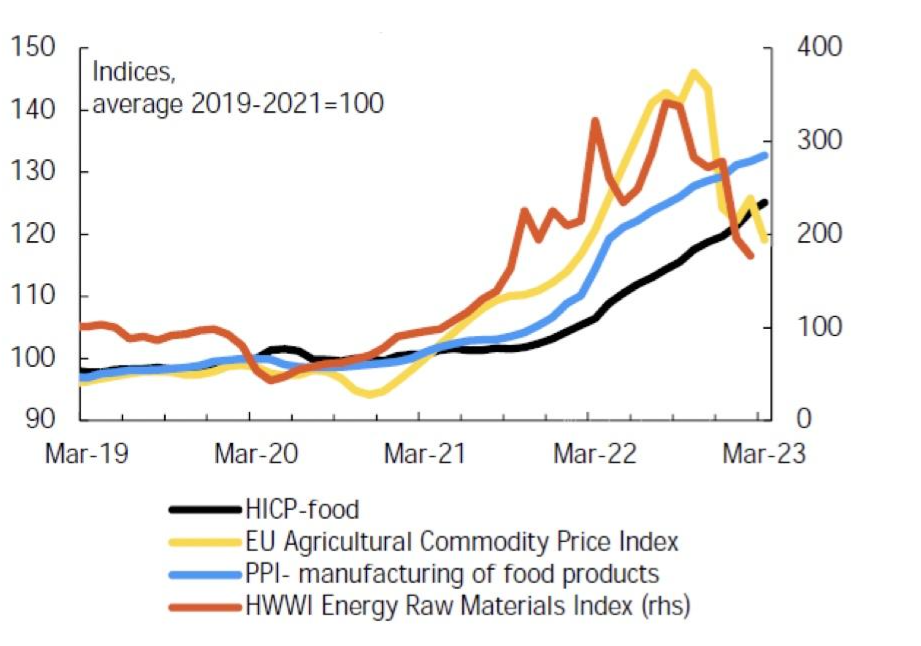Dutch ECR Group vice president Robert Roos claims: “Energy and food are becoming more expensive and companies are leaving. It is time to stop the green deal.” This statement turned out to be mostly false.
On 12 March 2024, the European Conservatives and Reformists Group (ECR Group) tweeted a quote from their vice president Robert Roos, representative of the Netherlands in the European elections. The quote is excerpted from a debate held on 12 March 2024, during which Roos advertises his own political party, appealing to the current common concern due to rising food and energy prices, claiming that these are due to the European Green Deal project. This claim is mostly untrue, as the rise in costs in Europe is undeniable, but it is not due to the Green Deal package, rather it is a long-term consequence of COVID-19, as well as the invasion of Ukraine by Russia.
As a source for his statement, Roos quotes what Diederick Samsom said during a discussion with Bruegel on 31.03.2022. Samsom has a significant role in the European Green Deal, as he is the Head of Cabinet for Executive vice president of the European Commission, Frans Timmermans, who is in turn the main figure responsible for the European Green Deal.
The relationship between Roos and Samsom is conflictual and characterized by tensions, especially with respect to climate policy, as Samsom is an outspoken supporter of measures to combat climate change and promote sustainability, while Roos has criticized these initiatives, seeing them as detrimental to the economy and national sovereignty. Samsom can be considered a primary source, as he works closely with Timmermans on the project he explained during the debate. However, there is no explicit mention of the Green Deal, but rather of measures to make Europe independent of Russia, so Roose used a statement from Samsom decontextualising it to express his own concept.
What is the Green Deal?
The Green Deal is a package of policy initiatives that aims to put the EU on the path to a green transition, with the ultimate goal of achieving climate neutrality by 2050. In 2019, the European Parliament declared a climate emergency and consequently presented a new strategy that, among other things, aims to reduce greenhouse gas emissions by 55% by 2030 (compared to 1990 levels). Plans were also formulated to reduce pollutant emissions, to combat deforestation, to encourage the spread of organic farming and the implementation of a circular economy model. Although there are high costs associated with this transition, many experts emphasize the long-term economic and environmental benefits.
Price increase
As claimed by Roose, data from the Hamburg Institute of international economics shows that prices for energy and food have increased significantly, reaching a major peak between 2022 and 2023.

According to experts, however, the reasons for these increases would be global factors such as the long-term effects of the COVID-19 pandemic and the Russian invasion of Ukraine that started in 2022, which had an aggravating effect. On 30 and 31 May 2022, the European Council agreed to ban almost 90% of all Russian oil imports by the end of 2022, with a temporary exception for crude oil supplied by pipeline. Russian military aggression against Ukraine therefore has a direct impact on food security and affordability worldwide.
Leaving companies
Regarding company closures, what Roos said is partially true. In effect, due to new environmental regulations that increase operating costs in the short term, some companies may be forced to close or relocate. However, many other companies are investing in green and sustainable technologies, seeing the green transaction as an opportunity.
Conclusion
Considering all points, the statement contains elements of truth such as rising prices and a partially true generalization, i.e. that some companies leave.
The legislative proposals of the Green Deal are wide and complex, and politicians merely evaluate them in the political discourse with polarization (for or against), instead of going into detail. Indeed, right-political parties are common to conflate sustainability and the economic interests of industries or farmers, as well as for green and left-wing parties to attack the EU for its lack of action to save the planet from the climate crisis. However, cost inflation in Europe is not due to the green deal but to other causes such as the pandemic or the war in Ukraine.
Roos’ assertion is therefore a stance due to his own political orientation and personal thinking, rather than a well-founded fact. We therefore conclude that the claim is mostly false.
RESEARCH | ARTICLE | Claudia Orecchio, Hochschule der Medien (Stuttgart, Germany)
Leave your comments, thoughts and suggestions in the box below. Take note: your response is moderated.






